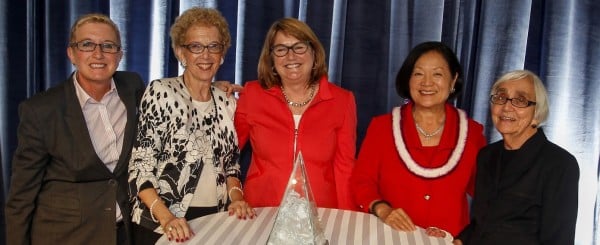Growing numbers of women in political leadership roles give Margaret Brent nominees hope for change

Left to Right: Therese M. Stewart, Gladys Kessler, Sara Holtz, Mazie K. Hirono and Marygold Shire Melli. Photo by Tony Avelar.
The five recipients of this year’s Margaret Brent Lawyers of Achievement Award are leaders in changing the status of women in the legal profession and in general. But at the luncheon held in their honor Sunday, there was a renewed sense of urgency in the overriding theme in their speeches those of other ABA leaders: that true change is still distressingly slow.
ABA President Laurel Bellows, whose term ends this week, went through details of pay disparity in women’s comparable work for incomparable pay, raising her voice in a huge, crowded conference room at the Moscone Center.
“I want you to tell me why, at this hour in this country, we are even discussing equality, diversity, when everyone agrees that discrimination is wrong and that inequality is wrong and that people should get paid the same and have equal opportunities. And yet we still get pushed back,” Bellows said with frustration.
The Margaret Brent awards, named after the first woman lawyer in the nation, honor those women lawyers who knock down walls, break through glass ceilings or pave the way others to do so.
Award recipient Mazie K. Hirono, a U.S. senator from Hawaii, is the first Asian-Pacific American woman elected to that legislative body and the first Asian-born immigrant. Her mother left an abusive husband in Japan, taking her children to Hawaii to live in the United States when Hirono was around 8 years old and did not speak English.
Hirono remarked on the gradually increasing number of women in Congress and the impact that brings. She is a member of the Judiciary Committee.
“Our presence makes a difference when we talk about issues such as sexual assault in the military,” Hirono said.
That theme was revisited moments later in the acceptance speech by co-honoree, Judge Gladys Kessler, a senior U.S. district judge in Washington, D.C.
These are “times of dark and dangerous threat to the welfare and freedom of women and children,” Kessler said, mentioning “assaults on what we though had become the inalienable right of women to control their own bodies,” children going hungry, human trafficking of women as domestic and sex workers, and women in the military “subjected to physical and sexual abuse with little or no consequence for their attackers.”
With more women entering Congress and getting significant committee chairs and other posts, its makeup will change, and “I am hoping certainly that some of these situations will change,” Kessler said.
This year’s honorees:
Mazie K. Hirono
She was the first Asian-Pacific American woman elected to the U.S. Senate, was a member of Hawaii’s House of Delegates and later the same in the U.S. Congress, and a two-term governor. In Congress she has worked to ensure that federal immigration legislation focuses on the human element.
Sara Holtz
She graduated from Yale College in 1972 and was instrumental in organizing the Women’s Law Association at Harvard Law School. Holtz became the first woman to chair what is now called the Association of Corporate Counsel and became vice president and general counsel of Nestlé Beverage Co. In 1997, Holtz launched ClientFocus, a company geared to helping women lawyers become rainmakers. She wrote a book on the topic: Bringin’ in the Rain: A Woman Lawyer’s Guide to Business Development.
Gladys Kessler
Before becoming a federal district judge in 1994, Kessler was a judge on the Superior Court of the District of Columbia for 17 years. She was instrumental in the development of the D.C. Domestic Violence Coordinating Council and in 1979 was among the women judges who founded the National Association of Women Judges.
Marygold Shire Melli
When Melli graduated from the University of Wisconsin Law School in 1950, the dean posted a list of students to be interviewed by law firms and companies for jobs. She asked the dean why she wasn’t on the list, and he told her no one would hire her, so why waste the time. She went on to teach at the law school for 33 years, develop the school’s curriculum for family law and, while working full time, adopt and raise four children with her husband. Melli has served as co-chair of the University of Wisconsin System Board of Regents’ Task Force on the Status of Women.
Therese M. Stewart
As a young lawyer, Stewart quickly gravitated toward working for gender equity. At the Howard Rice Nemerovski Canady Falk & Rabkin in San Francisco, where she would become partner, Stewart’s first pro bono case concerned single mothers denied head of household benefits by the state of California. Her most noted work has been i the California state and federal court cases relating to gay marriage. She moved to the city attorney’s office in 2002, and two years later defended the mayor’s decision to grant marriage licenses to same-sex couples. Later that year, theSupreme Court of California ruled that the marriages were void, and Stewart and her legal team filed a legal challenge to the state’s discriminatory marriage laws. After a long slog through litigation, including over a voter referendum, same-sex marriages in California resumed in June.



